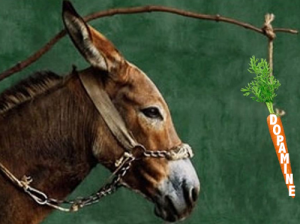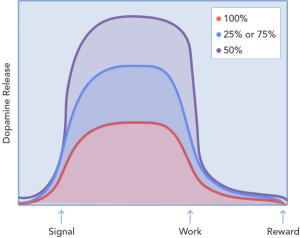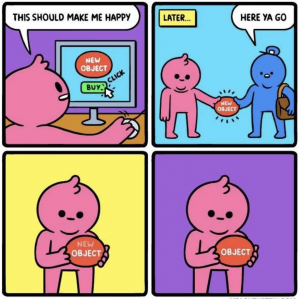Dopamine: Difference between revisions
mNo edit summary |
mNo edit summary |
||
| Line 1: | Line 1: | ||
[[File:Dopamine carrot stick donkey.png|alt=Dopamine_carrot_stick_donkey|thumb|'''Figure 1'''. Dopamine is not the goal. Dopamine release causes the progression to a goal.[[File:Dopamine in action.png|alt=Dopamine in action|thumb|'''Figure | [[File:Dopamine carrot stick donkey.png|alt=Dopamine_carrot_stick_donkey|thumb|'''Figure 1'''. Dopamine is not the goal. Dopamine release causes the progression to a goal.[[File:Dopamine release curve.png|alt=Dopamine release curve|thumb|'''Figure 2'''. Dopamine release curve.]][[File:Dopamine in action.png|alt=Dopamine in action|thumb|'''Figure 3'''. Dopamine in action]]]]'''Dopamine is a neurochemical, that works in animal brains to incentivise them to do stuff (Figure 1)'''. | ||
When your dog sees a ball you are about to throw it causes dopamine to be released which causes a type of ''craving'' to for the ball. This means dopamine is not so mush the actual reward but more the incentiviser. The release of dopamine only occurs in the wanting stage (see '''Figure 2'''), '''i.e.''' between seeing the ball (signal) and actually getting it (reward)<ref>'''Observations from the Neuroscience and Psychology Laboratory.''' Kent C. Berridge. An Interdisciplinary Journal of Philosophy Volume 52, 2009 - Issue 4 Pages 378-398. Published online: 12 Aug 2009, accessed on 17th July 2022 via: <nowiki>https://doi.org/10.1080/00201740903087359</nowiki></ref>. | |||
This process is ''addictive,'' once complete, the dog looks for its next trigger, that starts the dopamine release again ('''Figure 3'''). This process could proceed infinitely however within every cycle is a downward step, a negative feedback loop, which means everytime the dog runs and gets the ball its reserve energy reduces a notch and eventually the dog tiredness overcomes the want for another reward and it stops. | |||
The main difference between humans and a dog in is that you can perform longer loops as opposed to shorter loops due to your neocortex having the ability to discern time. This is called the [[Curse of Sisyphus]], dopamine far from being the ''reward'' molecule is actually the ''greed'' molecule. | |||
'''Reference''' | '''Reference''' | ||
<references /> | <references /> | ||
Revision as of 21:46, 20 November 2022
Dopamine is a neurochemical, that works in animal brains to incentivise them to do stuff (Figure 1).
When your dog sees a ball you are about to throw it causes dopamine to be released which causes a type of craving to for the ball. This means dopamine is not so mush the actual reward but more the incentiviser. The release of dopamine only occurs in the wanting stage (see Figure 2), i.e. between seeing the ball (signal) and actually getting it (reward)[1].
This process is addictive, once complete, the dog looks for its next trigger, that starts the dopamine release again (Figure 3). This process could proceed infinitely however within every cycle is a downward step, a negative feedback loop, which means everytime the dog runs and gets the ball its reserve energy reduces a notch and eventually the dog tiredness overcomes the want for another reward and it stops.
The main difference between humans and a dog in is that you can perform longer loops as opposed to shorter loops due to your neocortex having the ability to discern time. This is called the Curse of Sisyphus, dopamine far from being the reward molecule is actually the greed molecule.
Reference
- ↑ Observations from the Neuroscience and Psychology Laboratory. Kent C. Berridge. An Interdisciplinary Journal of Philosophy Volume 52, 2009 - Issue 4 Pages 378-398. Published online: 12 Aug 2009, accessed on 17th July 2022 via: https://doi.org/10.1080/00201740903087359


